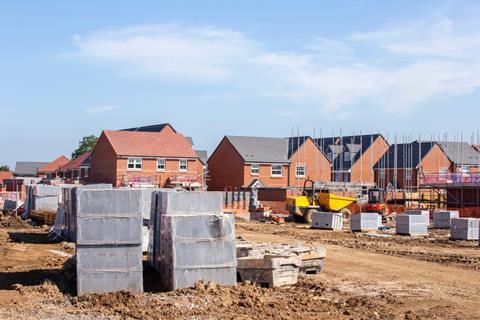New regime will ‘protect consumers and drive up quality’ and could be run by the private sector
The government has confirmed it will require anyone who is in the business of building new homes to join the New Homes Ombudsman (NHO) when the legislation setting out the new system comes into force.

Two years ago the government set out its plan to create an ombudsman for consumers buying new homes, and last July it launched a consultation on what form it might take.
Ministers were forced to act after a barrage of complaints about the quality of homes being built across the UK by a number of developers.
Persimmon, the UK’s largest housebuilder by market capitalisation, came in for withering criticism last year in a report it commissioned into its own practices which found it had focused on being a land buyer and homeseller, rather than a builder, with no group build processes or systems in place to ensure quality.
While the eventual launch of the NHO is subject to a vote in Parliament, ministers insisted that once it is underway the new scheme would protect consumers and drive up building quality.
Publishing the results of its NHO consultation this week, the government said consumers should be able to expect to buy a well-built new home and receive good quality customer service, and action should be taken against those who failed to deliver on both counts.
While it acknowledged the NHO would not be a regulator, the government said it wanted the new ombudsman to deliver wider benefits to consumers and drive up improvements in the new build homes sector. “This includes building new homes of the highest standards and quality as well as ensuring new homes are sustainable and fit for the future,” the government added.
The government said it would seek to roll out just one NHO scheme – which will apply to all those individuals and organisations, including housing associations, who build new homes – and ministers indicated it could be run by the private sector.
“We do not agree with the argument that only a public sector scheme can be independent as there are independent private sector organisations acting as ombudsman across different sectors of the market and accountable to government,” the report said. A private sector scheme “would also be at no cost or risk to the taxpayer, whereas a public sector body could be a liability on the government’s accounts”.
The government said a resulting code of practice should reflect the whole building and selling process.
Fees to join the eventual NHO would be lower for smaller housebuilders than for larger housebuilders “in order to be fair”, while consumer access to the ombudsman would be free of charge.
The government’s report said the NHO would be tasked with resolving disputes at an early stage and on an informal basis. “This will mean that disputes do not continue to escalate, and problems are nipped in the bud,” it said.
The NHO could make awards of up to £50,000 following a dispute between a home-buyer and a developer, the report added.
Reacting to the announcement Brian Berry, chief executive of the Federation of Master Builders (FMB) said it was a step in the right direction for consumers and house builders alike.
“As the FMB had demanded, it is correct that the New Homes Ombudsman will be backed up by law. We are pleased that the government has recognised the new system must not be burdensome to small and medium-sized house builders.
“Any new consumer code must also ensure that all new homes are covered by the highest-rated insurance companies,” Berry added.
The New Homes Ombudsman’s powers will include:
• Ability to make awards for compensation to the homebuyer
• Publishing details and reasons for expulsion
• Direct developers to improve their service
• Request information from the developer
• Request developers to undertake or refrain from undertaking work
• Ability to make recommendations to resolve disputes and timescales for rectifying disputes
• Requesting apologies and explanations from developers
Source: MHCLG











No comments yet